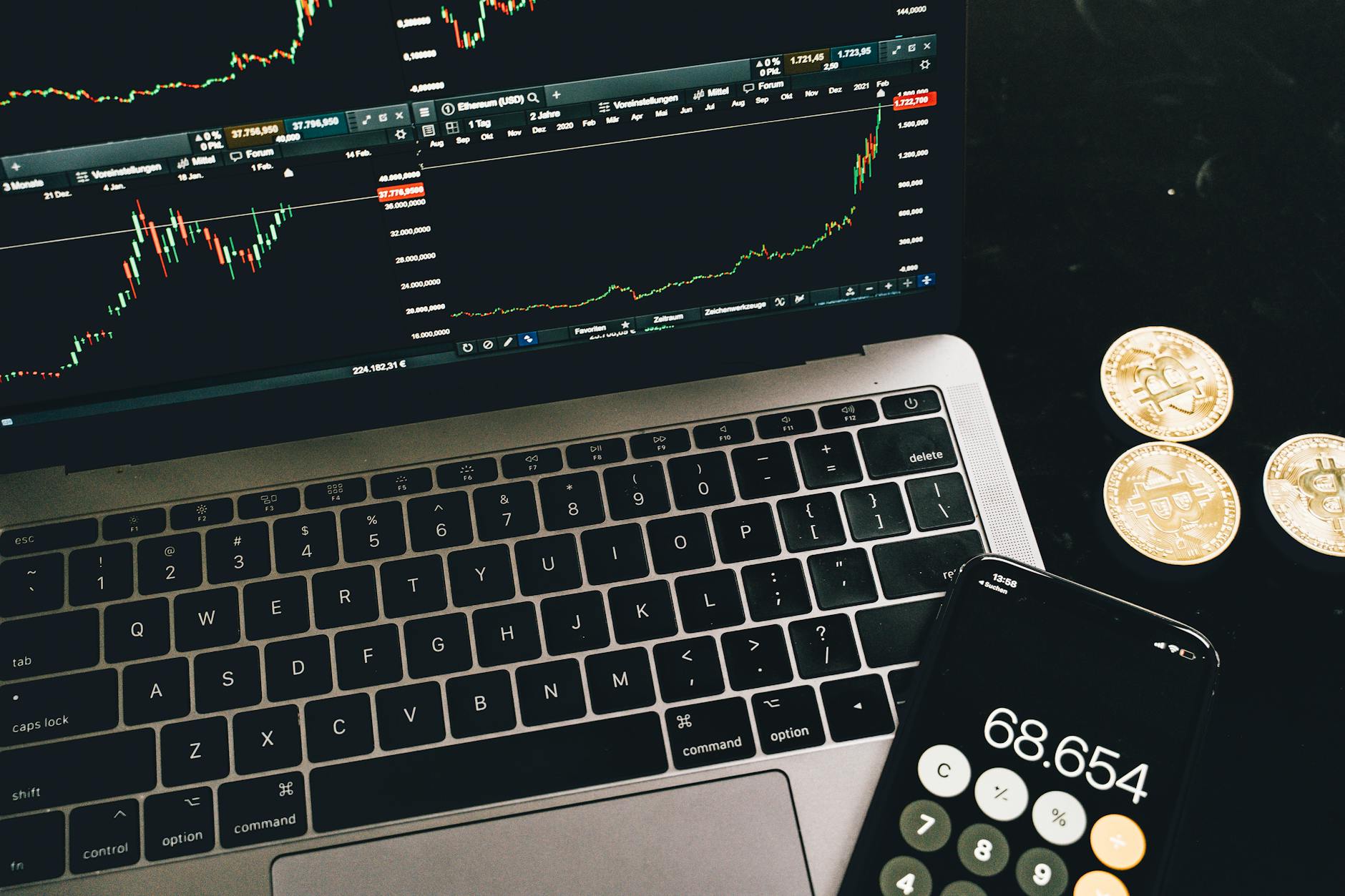The Best Cryptocurrency Exchanges
Cryptocurrency exchanges are the backbone of the digital trading world, connecting millions of users with the tools they need to buy, sell, and manage digital assets. These platforms make it easy to trade everything from Bitcoin to lesser-known altcoins while providing essential security and liquidity. As the crypto market evolves, exchanges are adapting with features like staking rewards, lower fees, and better mobile apps. In this post, we’ll explore the top exchanges to consider in 2025, highlighting why they’re leading the way in reliability, features, and user experience.

What Are Cryptocurrency Exchanges?
Cryptocurrency exchanges are platforms that act as markets for trading digital assets like Bitcoin, Ethereum, and countless other cryptocurrencies. Think of them as a bridge connecting buyers and sellers, similar to a stock exchange, but for crypto. These exchanges allow you to buy, sell, and often store your digital coins. They also provide insight into price trends and access to tools for managing your portfolio. However, not all crypto exchanges are created equal. There are two distinct types to know about: centralized exchanges (CEXs) and decentralized exchanges (DEXs). Let’s break them down.
Centralized Exchanges (CEXs)
Centralized exchanges, or CEXs, work like traditional financial institutions. They are operated by companies that manage every aspect of the trading process. These platforms act as intermediaries, where users create accounts, deposit funds, and trade cryptocurrencies within a secure ecosystem. Convenience is key here.
Features of CEXs:
- User-friendly: Designed with beginners in mind, these platforms provide straightforward interfaces.
- Support for fiat currency: CEXs often support deposits and withdrawals in USD, EUR, and other fiat currencies.
- High liquidity: They attract millions of users, ensuring trades happen quickly and at fair market prices.
- Extra features: Services like staking, borrowing, and even crypto debit cards enhance the user experience.
However, centralization comes with trade-offs. Users must trust the platform to safeguard assets, control private keys, and protect sensitive data. High-profile exchanges like Coinbase and Binance are well-known examples of centralized exchanges. Learn more about centralized cryptocurrency exchanges here.
 Photo by Alesia Kozik
Photo by Alesia Kozik
Decentralized Exchanges (DEXs)
Decentralized exchanges, or DEXs, are built on blockchain technology. They enable peer-to-peer trading without a middleman. Instead of central systems, trades occur directly between users via smart contracts—self-executing programs coded to facilitate transactions.
Advantages of DEXs:
- Enhanced privacy: DEXs don’t require users to divulge personal data or complete KYC (Know Your Customer) processes.
- Reduced fees: Trading directly with others often minimizes costs compared to centralized platforms.
- Autonomy: Users hold their private keys, maintaining full control over their assets.
- Resilience to censorship: DEXs aren’t dependent on any single company, reducing risks tied to regulatory shutdowns.
Platforms like UniSwap and PancakeSwap have gained popularity among crypto enthusiasts. Still, decentralized exchanges may feel intimidating to newcomers due to their technical nature. To better understand how DEXs work and the differences between them and CEXs, check out this breakdown on decentralized exchanges.
While both types of exchanges have their strengths and weaknesses, understanding them is key to navigating the vast world of crypto trading. Whether you prioritize convenience or personal control, your choice of exchange will depend on your trading style and objectives.
You’ll Like This article on Best Crypto Wallets
Top Cryptocurrency Exchanges of 2025
As we move into 2025, cryptocurrency exchanges continue to innovate and lead with cutting-edge features that cater to traders, investors, and crypto enthusiasts worldwide. From user-friendly platforms to robust security measures, these exchanges have unique advantages to suit different trading styles and preferences. Let’s explore some of the top-performing platforms of the year.
Coinbase: User-Friendly and Secure
Coinbase remains a go-to choice for beginners entering the crypto space, thanks to its straightforward interface. Along with offering a diverse selection of cryptocurrencies, Coinbase stands out with initiatives like its Learn-to-Earn program. This innovative approach educates users about blockchain technologies while rewarding them with free crypto for completing simple lessons.
What adds to Coinbase’s appeal? U.S. customers’ cash balances are insured up to $250,000 through FDIC insurance, creating a safety net that is hard to beat. While its ease of use is unmatched, high trading fees remain a drawback, especially for retail traders seeking cost-effectiveness.
Explore how Coinbase is shaping the market in 2025 with insights here.
Kraken: Advanced Features and Security
Kraken continues to establish itself as a leader with its intense focus on user security and advanced trading features. Known for its fast transaction processing, Kraken supports a wide array of cryptocurrencies, making it suitable for experienced traders and institutions. This platform is also lauded for its low fees on Kraken Pro, which appeal to high-volume traders.
Educational resources offered by Kraken ensure that users at all expertise levels can enhance their trading skills. Combine this with an industry-leading reputation for security, and Kraken stands out as a favorite in the crypto community.
Dive deeper into Kraken’s features with this 2025 review of their platform.
Binance.US: Low Fees and Accessibility
Binance.US shines in the market due to its low trading fees and compatibility with fiat currencies such as USD. Its staking options also allow investors to generate passive income from their crypto holdings. However, the lack of crypto futures and margin trading might deter some advanced traders seeking more complex financial tools.
Despite these missing features, Binance.US remains one of the most accessible and affordable platforms for users based in the U.S., making it a solid entry point into the crypto world.
Gemini: Secure but Pricey
Gemini stands apart when it comes to security certifications, featuring SOC 1 and SOC 2 compliance, which demonstrates its commitment to keeping user funds safe. Its ActiveTrader platform offers a seamless experience for professional-level trading, including tools for crypto derivatives.
While Gemini has a reputation for being highly secure, its fees are often highlighted by users as being higher than those of its competitors. However, for those who prioritize security and advanced trading features above cost, Gemini is still a top contender.
Check out Gemini’s updates and features here.
Crypto.com: Comprehensive Mobile Platform
Crypto.com leads mobile innovation with its sleek, easy-to-use app that caters to traders on the go. With extensive staking options and crypto rewards through its VISACrypto card, Crypto.com makes passive income accessible for users of all levels.
The platform also emphasizes security with robust two-factor authentication systems. However, some users express concerns about occasional performance drops during peak trading hours. Yet, it remains one of the most comprehensive platforms combining accessibility with valuable features.
Discover more about Crypto.com’s future roadmap for 2025 here.
 Photo by Jakub Zerdzicki
Photo by Jakub Zerdzicki
These platforms showcase the best cryptocurrency exchanges of 2025, each bringing something unique to the table. Whether you’re looking for a beginner-friendly interface, advanced trading tools, or mobile-first solutions, there’s an exchange to match your needs.
Key Features to Look for in a Crypto Exchange
Choosing the right cryptocurrency exchange is essential for both beginners and seasoned traders. It’s not just about finding a place to trade—it’s about security, reducing costs, having access to various digital assets, and even earning rewards. Not all exchanges offer the same advantages, so here’s a breakdown of key features to watch for.
Security and Compliance
In crypto trading, safety should always come first. Scams, cyberattacks, and fraudulent exchanges are real threats to your investments. High-quality exchanges implement strong security practices to protect their users.
Here are some security features you should prioritize:
- Cold Storage: Storing most funds offline protects them from hacking attempts.
- Two-Factor Authentication (2FA): Adds an extra layer of protection by requiring you to confirm your login via a separate device.
- Regulatory Compliance: Exchanges that comply with local regulations are more transparent and less likely to shut down without notice. Take the time to see if the platform has proper licensing or registrations in place.
Want to know more about staying safe on blockchain platforms? This safety guide for Bitcoin and crypto trading explains how regulation and security policies work in-depth.
Fee Structures
The fee structure of an exchange can make—or break—your profitability.
- Trading Fees: Some exchanges charge a percentage per trade, while others offer flat fees. Look into how fees decrease with higher trading volumes, especially if you’re an active trader.
- Withdrawal Fees: Plan for costs when moving your crypto to external wallets. These fees vary, so choose platforms transparent about these charges.
- Hidden Costs: Always read the fine print, as some exchanges tack on additional fees for inactive accounts or overnight orders.
A lower fee platform can save you money in the long run, especially if you’re just starting. Transparency is key; avoid platforms that bury fees under complex structures.
Ease of Use and Accessibility
Whether you’re new or experienced, no one wants to wrestle with a confusing interface. A great crypto exchange makes the process smooth and intuitive.
Features to consider include:
- User-Friendly Design: Look for visually clear and easy-to-navigate platforms.
- Mobile App Performance: Many exchanges now offer powerful mobile apps, ideal for managing your portfolio on the go.
- Educational Tools: New to crypto? Some sites offer tutorials, FAQs, and guides aimed at teaching you market movements and trading techniques.
User experience matters. Platforms with clean layouts and vibrant communities often end up being better for long-term use.
Variety of Supported Cryptocurrencies
Traders and investors benefit from having access to multiple cryptocurrencies. While Bitcoin and Ethereum dominate the market, there’s an ocean of altcoins with potential.
Why does diversity matter?
Engaging with lesser-known tokens provides opportunities to explore emerging blockchain technologies. Additionally, holding a varied portfolio can lower market risk.
Some exchanges also offer unique tokens only available on their platform, giving traders exclusive trading choices. Always review currency listings to see how often the platform updates its roster.

Photo by Ivan Babydov
Staking and Rewards Programs
Want to make passive income while you trade? Staking—and rewards programs—let users earn profits simply by holding onto specific cryptocurrencies.
- Staking: Many exchanges offer staking options for coins like Ethereum 2.0, allowing you to “lock” assets for network support and earn yield in the process.
- Loyalty Rewards: Platforms like Crypto.com even offer cashback programs or bonus coins based on trading activity.
This is an excellent feature for long-term holders looking to grow their investments passively. Always check lock-in periods before committing funds to staking.
Understanding these elements can set you on the path to successful trading. With the right tools and features, your chosen crypto exchange can become a cornerstone for all your digital asset opportunities.
Future Trends in Cryptocurrency Exchanges
The cryptocurrency exchange landscape continues to evolve rapidly, signaling a future filled with innovation and transformation. Exchanges are no longer merely platforms for trading; they are becoming ecosystems that redefine how traders, investors, and institutions interact with digital assets. Below, we explore key trends shaping the future of this dynamic industry.
Rise of Decentralized Platforms
Decentralized Exchanges (DEXs) are becoming more prominent, offering users more control and security. Unlike centralized exchanges (CEXs), DEXs let you trade directly with others via blockchain-powered smart contracts, bypassing intermediaries. This shift toward decentralization appeals to privacy-conscious users who value autonomy over their funds.
Platforms like Uniswap and Curve are setting the stage for the expansion of decentralized trading. What’s fueling this shift? Concerns about data breaches, rising regulatory scrutiny, and the growing appeal of self-custody. While DEXs bring reduced fees and censorship resistance, their challenge lies in achieving the ease-of-use and high liquidity that CEXs provide. As more traders seek flexible, non-custodial options, expect hybrid models that merge the best of both systems.

Photo by RDNE Stock project
Focus on Sustainability and ESG Compliance
As the world shifts toward greener practices, the crypto industry faces pressure to align with environmental, social, and governance (ESG) standards. One of the most significant criticisms of crypto has been its energy-intensive processes, particularly in mining. Leading exchanges are stepping up, with initiatives aimed at sustainable energy and carbon-neutral operations.
Some platforms are adopting carbon offset programs or partnering with renewable energy providers to minimize eco-impact. The switch to proof-of-stake, as seen with Ethereum’s transition in 2022, marked the start of this movement. Looking ahead, we can expect exchanges to emphasize eco-friendly practices in their branding and operations, appealing to environmentally conscious traders and institutional investors.
Explore more about the climate impact of crypto through this insightful analysis from Mastercard.
Integration of Blockchain Interoperability
Interoperability—the ability for different blockchain networks to connect and communicate—is a game-changer for crypto exchanges. Current platforms work in silos, which limits seamless trading between assets on different blockchains. However, advancements in interoperability protocols are diving headfirst into solving this fragmentation.
Take Polkadot and Cosmos, two platforms designed to enable cross-chain communication. Future exchanges embracing multi-chain compatibility will make it easier for users to move assets across networks like Ethereum, Solana, and Binance Smart Chain. This integration not only enhances user experience but also opens up opportunities for developers to build expansive ecosystems that transcend individual chains.
For more insights on blockchain advancements, check out this comprehensive review on emerging crypto trends.
Institutional Crypto Adoption
Institutional investors, who once approached crypto cautiously, are now embracing digital assets with significant interest. With Bitcoin ETFs, tokenized real-world assets (RWAs), and governments exploring central bank digital currencies (CBDCs), big players are moving into the space like never before. This influx is transforming cryptocurrency exchanges.
Expect to see exchanges tailoring services for institutional needs: enhanced liquidity, regulatory-compliant frameworks, and tools for portfolio management. Think features like enterprise-grade custody solutions, advanced analytics, and deeper integrations with traditional financial systems. Platforms offering these services are set to dominate the market in the coming years.
Discover how institutions are shaping the future of digital assets in this article from Kraken.
The cryptocurrency exchange market is at an inflection point. Sustainability, decentralization, interoperability, and institutional adoption are just a few of the trends driving this evolution. As these forces reshape the landscape, the exchanges that adapt fastest will lead the way into the future of trading.
Conclusion
The leading cryptocurrency exchanges in 2025 demonstrate how far the industry has come, offering exceptional tools for both beginners and seasoned traders. Whether it’s security, minimal fees, or access to diverse assets, these platforms continue to innovate in ways that cater to individual trading needs.
Choosing the right exchange boils down to understanding your goals—whether you value user-friendly interfaces, advanced trading features, or mobile accessibility. As the crypto space evolves with decentralized finance and institutional adoption, the role of exchanges will only grow more pivotal.
Take the time to research and align with a platform that matches your priorities. By doing so, you position yourself for success in this dynamic market. The future of trading is here—are you ready to embrace it?

